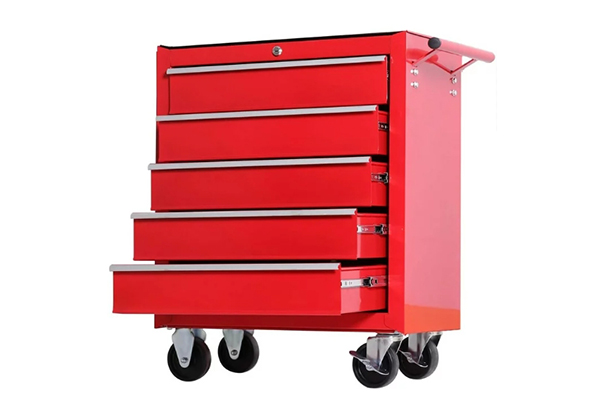A portable tool box is an essential item for professionals and hobbyists alike, providing a convenient and organized way to store and transport tools. With advancements in design and materials, portable tool boxes have evolved to meet the diverse needs of users, from DIY enthusiasts to professional contractors. This article delves into what a portable tool box is, its various types, and the benefits of using a rolling tool box for enhanced mobility and convenience.
Defining a Portable Tool Box
A portable tool box is a compact, often lightweight container designed for the storage and transport of tools. These tool boxes come in various sizes and materials, including plastic, metal, and composite materials. They feature compartments, trays, and drawers to organize tools efficiently, making it easy to access and identify items quickly. Portable tool boxes are indispensable for anyone who needs to carry tools from one place to another, ensuring that tools are kept safe, organized, and readily available.
Types of Portable Tool Boxes
Hand-Carried Tool Boxes: These are the most basic form of portable tool boxes, featuring a single compartment or multiple trays. They usually come with a sturdy handle for easy carrying. Hand-carried tool boxes are ideal for light-duty tasks and small-scale projects, where only a limited number of tools are needed.
Tool Bags: Made from durable fabric, tool bags offer flexibility and multiple pockets for organizing tools. They are lightweight and easy to carry, making them suitable for on-the-go tasks. Tool bags are often used by electricians, plumbers, and other professionals who require quick access to their tools.
Rolling Tool Boxes: A step up from hand-carried models, rolling tool boxes are equipped with wheels and a telescoping handle, similar to a suitcase. This design allows for easy transportation of heavier and bulkier tools, reducing physical strain. Rolling tool boxes often have multiple compartments and drawers, providing ample storage space and organization.
Benefits of a Rolling Tool Box
The tool box rolling design offers numerous advantages, particularly for those who need to transport a large number of tools or heavier equipment. Here are some of the key benefits:
Enhanced Mobility: The primary advantage of a rolling tool box is its mobility. The wheels and telescoping handle make it easy to move the tool box across different terrains, from smooth workshop floors to rough construction sites. This mobility is especially beneficial for professionals who frequently travel between job sites.
Reduced Physical Strain: Carrying a heavy tool box can lead to physical strain and potential injury. A rolling tool box eliminates the need to lift and carry, reducing the risk of back and shoulder injuries. This makes it an ergonomic choice for professionals who spend long hours working with tools.
Increased Storage Capacity: Rolling tool boxes typically offer more storage space than hand-carried models. They often feature multiple drawers, trays, and compartments, allowing for better organization and easy access to tools. This increased capacity means that users can carry a comprehensive set of tools, ensuring they are prepared for any task.
Durability and Protection: Many rolling tool boxes are built with robust materials designed to withstand the rigors of frequent transportation and tough work environments. They provide excellent protection for tools, keeping them safe from damage and ensuring longevity.
Versatility: Rolling tool boxes come in various sizes and configurations, catering to different needs and preferences. Some models are modular, allowing users to add or remove components based on their requirements. This versatility makes rolling tool boxes suitable for a wide range of applications, from small DIY projects to large-scale industrial work.
Applications of Rolling Tool Boxes
Rolling tool boxes are used in a variety of settings, reflecting their versatility and practicality. Here are some common applications:
Construction Sites: Contractors and builders use rolling tool boxes to transport and organize their tools on-site. The mobility and storage capacity of rolling tool boxes are particularly useful in dynamic construction environments.
Automotive Workshops: Mechanics and automotive technicians rely on rolling tool boxes to keep their tools organized and easily accessible. The durability of these tool boxes ensures they can withstand the demands of a busy workshop.
Home Improvement Projects: DIY enthusiasts and home renovators use rolling tool boxes to carry and organize their tools for various projects around the house. The convenience of a rolling tool box makes it easy to move tools from one room to another.
Electrical and Plumbing Work: Electricians and plumbers benefit from the organization and mobility provided by rolling tool boxes. They can quickly locate the tools they need and transport them to different job sites without hassle.
Conclusion
A portable tool box is an invaluable asset for anyone who uses tools regularly, providing organization, protection, and easy transport. Among the various types of portable tool boxes, the rolling tool box stands out for its enhanced mobility, storage capacity, and ergonomic design. Whether for professional use on construction sites and workshops or for home improvement projects, a rolling tool box ensures that tools are always at hand and ready for use. The tool box rolling design revolutionizes how tools are transport
Post time: 07-24-2024




